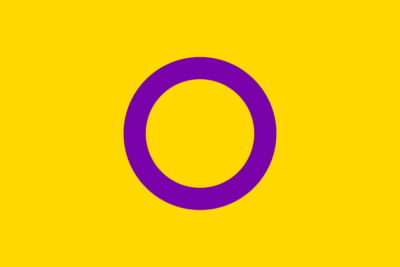There are a lot of acronyms used in our community - LGBT, LGBTQ+, LGBTQIA2S+, and so on. Have you ever wondered what the "I" stands for? This is in recognition of the Intersex community, and this month we're going to learn about one of my favorite advocacy groups fighting for intersex youth, interACT!
First off, what does "intersex" mean? Intersex is an umbrella term used to describe people who are born with differences in sex traits or reproductive anatomy. Someone who is intersex used to be referred to as a "hermaphrodite", but that term is now outdated and considered offensive, so let's strike that from our vocabulary. Most of these differences are either present at birth or develop during childhood through to puberty, which may or may not be visually noticeable. For example, a child could have external male parts, but internally they have female parts, or they may be born with chromosomal differences that change what hormones their bodies produce throughout their lives (and would genetically not be categorized as entirely male or female). Someone might not know they are intersex until they try to have their own children, where medical testing could show that they have different internal reproductive organs than they had believed. Often, physical differences are visually present at birth, and sadly many doctors and parents make the decision to operate on their children before the child has any idea of who they are.
Unfortunately, throughout history, there has been a lot of pressure from doctors and parents to change intersex children's bodies because of shame and stigma. This can result in major physical health complications as well as being extremely harmful to the child's mental health later in life. According to a study done in 2016, 35 out of 37 parents of intersex children opted for "cosmetic surgery" on their children, and hospitals are not required to report these particular surgeries. There have been doctors that have even performed surgery on intersex newborns without informing the parents. Most of these surgeries occur before the child is two years old, long before they even understand themselves or have any autonomy, meaning they cannot give consent on their own. That is where organizations like interACT become so important.
Originally known as Advocates for Informed Choice, interACT was founded in 2006 with the intention to end harmful and unnecessary medical procedures on intersex children. The health and well-being of the children are what is wanted by everyone involved, which everyone can agree on, and interACT advocates that performing surgery on intersex youth goes against that goal and should be ended. The organization is made up of doctors, lawyers, mental health professionals, and leaders of different intersex organizations and members of the community. There is also interACT Youth, which operates a peer support group page called iSpeak for intersex youth. interACT also works to educate and train medical providers and school officials on how to properly care and provide for intersex youth, from physical needs to accommodations, based on the student's needs and comfort.
This month, I encourage all of you to educate yourselves more on the intersex community and look for ways you can help. To all the intersex folks out there, you are amazing and wonderful, and I send all my love to you. <3


